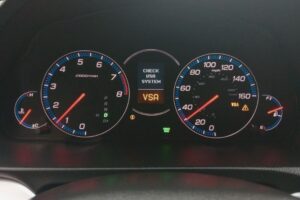Sometimes when you stop or slow down your car, the engine goes off for no reason whatsoever. No check engine light or any other warning sign. So, why does this happen? Why does your car shut off when stopped or slowed down?
When your car shuts off abruptly when stopped, this is usually because of a malfunctioning air control valve. The idle air control valve keeps track of the air intake. The other causes for this could include the following:
- A faulty engine control unit,
- An empty fuel tank with a damaged fuel gauge,
- Faulty alternator,
- A clogged fuel pump,
- Wiring problems, or
- A defective ignition switch and spark plugs.
Read on to learn more about the root cause of why a car shuts off when stopped or slowed down.
Why Does My Car Turn Off When I Stop?

Your car is built to function like a well-oiled machine, but sometimes this machine gets in trouble in unexpected locations. When your car turns off suddenly while in motion, it could be because of the following reasons:
- A faulty engine control unit
- A faulty crankshaft position sensor
- Faulty Alternator
- Fuel tank empty with faulty fuel gauge
- Clogged or Faulty Fuel Pump or System
- Faulty Ignition Switch
- Faulty Spark Plugs
Make sure to call a mechanic if your engine switches off while slowing down for a complete inspection:
1. Faulty Engine Control Unit
ECU Ensures Optimal Operation
A malfunctioning Engine Control Unit (ECU) or engine control module can cause a car to shut off while in motion.
The electronic control unit in your car is a computer that gathers data from many internal combustion engine components to ensure that the entire system is operating optimally and precisely to maximize efficiency.
Your car may shut off randomly due to unexpected drops in power, fuel economy, and spark loss caused by a malfunctioning ECU. Moreover, a malfunctioning ECU might cause your car to stall while driving. The check engine light can also appear in such a case.
Use an OBD Scanner to Examine the ECU
It is not simple to test and examine your ECU, unfortunately. And the check engine light does not always indicate an ECU issue. You can only use an OBD scanner to check what codes you receive if you want to try troubleshooting on your own.
It may still be unclear whether the code indicates a faulty ECU. The only thing you can do is take it to a qualified mechanic. A mechanic can diagnose your ECU using the appropriate equipment and software.
2. Faulty Crankshaft Position Sensor
Keeps Track of All the Engine’s Moving Parts
A malfunctioning crankshaft position sensor is a common problem when the car suddenly switches off while driving or stops. The crankshaft position sensor’s function is to keep track of all the engine’s moving parts, including the crankshaft, valves, and pistons.
It keeps track of the crankshaft’s speed and position to help determine when fuel injection and ignition should occur.
Signs of a Crankshaft Failure
Simply put, this system is necessary for your engine to operate at its best. A cylinder will misfire if the crankshaft position sensor fails to give the engine control unit accurate information about where the pistons are located in the engine.
The check engine light may activate if the crankshaft position sensor malfunctions. The tachometer not functioning correctly indicates that the crankshaft position sensor is broken.
The gauge on your dashboard that displays your car’s RPMs is called a tachometer and is usually placed next to your speedometer. Each time you crank your engine, the tachometer usually rises.
The ECU will then communicate information to the tachometer after obtaining data regarding engine speed from the crankshaft position sensor.
Therefore, a malfunctioning crankshaft position sensor will provide inaccurate and irregular data to the ECU, which is subsequently relayed and results in the tachometer functioning erratically or intermittently.
Other Signs of a Malfunctioning Crankshaft Position Sensor
Other typical signs of a malfunctioning crankshaft position sensor include the following:
- Decreased fuel economy,
- Rough running,
- Misfiring, and
- Full engine failure while driving.
Diagnostic Trouble Codes P0335 Through P0338
Using an OBD scanner to retrieve the error codes from the ECU is one way to determine if your crankshaft position sensor is malfunctioning. If you see diagnostic trouble codes P0335 through P0338, you know the crankshaft position sensor is not properly working.
3. Faulty Alternator
In Charge of Generating a Steady Flow of Electricity
Your car’s alternator is in charge of generating a steady flow of electricity. These electrical components include the dash lighting, dome lights, air conditioning unit, stereo, etc. It also uses this electrical energy to charge the battery.
Your car won’t receive the necessary electrical power if the alternator is malfunctioning for some reason, causing your car to shut off when you slow down or stop. When this happens, your dash will begin to flash.
A Healthy Battery Can Supply Electricity When the Alternator Fails for a Short Time
It is important to remember that if your battery is healthy and capable of supplying electricity when your alternator fails, your car might continue to run for a while without one, so you might not immediately be aware of the problem.
However, because the battery can’t power the whole of the car, your car can only run on it for a short time. Your vehicle will stall and eventually shut off after your battery is dead.
When an alternator is malfunctioning, your car will start to receive inconsistent power, which should be detectable if you pay close attention to how it operates.
Regularly Test Your Battery and Alternator
A simple DIY auto maintenance task is to test your battery and alternator regularly—say, every 4-6 months—using a multimeter or voltmeter.
Leave the engine running while turning off the stereo, and all possible electrical accessories, including the dashboard lights and the alternator itself.
Use the multimeter to test the batteries. A functional alternator should produce 13.1 to 14.6 volts at constant idle speed. If not, you should have a specialist give it a closer look.
4. Empty Fuel Tank with a Faulty Fuel Gauge
No doubt, a lack of fuel causes thousands of cars to shut off while driving each year.
Sometimes your gasoline gauge has gone defective and does not accurately reflect the fuel level in the tank. Some people may be too busy or forgetful to frequently check the fuel level and refill at the earliest possible time.
Failure of the sending unit is one of the many causes of defective gas gauges. Your fuel gauge will get stuck in one place, usually at the “F” or “E” mark, regardless of the fuel amount.
If you think your fuel gauge or fuel level sensor is malfunctioning, try to add 1 gallon (or 4 L) of gasoline to see if your car will start.
5. Clogged or Damaged Fuel Pump or System

Provides the Engine with Enough Fuel
If your car turns off when you stop accelerating, a malfunctioning fuel pump may be the cause. For combustion to produce enough power, your engine needs a precise fuel supply at an exact moment as an input.
The fuel pump is the component that provides the engine with enough fuel. It is similar to your car running out of gas when the motor shuts off if the engine doesn’t receive the proper amount of fuel at the right time.
There is no bypass for a malfunctioning gasoline pump, which is bad news. You will need to fix it or change it altogether.
Blocked Gasoline Filter
Your gasoline filter can also get blocked. The primary role of the fuel filter is to clean the fuel before it enters the engine.
The fuel pump may eventually become blocked with contaminants from old gasoline, which will interfere with the engine’s capacity to produce power and cause your car to shut off when stopped or slowed down.
Nylon or Paper Fuel Filter Needs Replacement
Replace your fuel filter if it is made of nylon or paper. If it is metal, all you have to do is clean and repurpose it. The majority of fuel pumps are mounted within the fuel tank.
By kicking the fuel tank with your foot, you can determine whether the fuel pump is to blame when your new car turns off when stopped at a light.
If the car starts at that point, your fuel pump most likely has a problem. The tank is composed of plastic. Therefore, do not bump it firmly with a metal object as you don’t want to break it.
6. Faulty Ignition Switch
Broken Plate May Cut Off the Ignition
Many metal plates inside the ignition switch can start to rust over time. Eventually, one of these plates may break contact, cutting off the ignition as a whole.
May Result in Abrupt Engine Shutdown
The system that regulates the amount of power passing through them may also stop functioning if the ignition relay malfunctions. These will result in an abrupt engine shutdown when you slow down your car or stop driving.
Check the Dashboard Lights After Shutting Off the Car
Fortunately, it is relatively simple to determine whether a broken ignition switch is to blame if your car keeps shutting off while driving. Check whether your dashboard lights are still on after the car shuts off.
The ignition switch is likely broken if the dashboard instrument is dead. After the car stops, try twisting the keys again while in the ignition. Your ignition most likely fails if the engine doesn’t start after this.
Again, why is my car shutting off when I come to a stop? When your car shuts off when you stop, then your car has a faulty idle air control valve. This valve monitors your car’s air intake while being mixed with fuel.
7. Faulty Spark Plugs
Enables the Engine to Produce Power
The small spark plugs are another essential component that enables your engine to produce power. These components ignite the engine’s combustion chamber’s air and fuel combination to create combustion. Each spark plug in a cylinder is independent.
Possible to Operate a Car with One Damaged Spark Plug
You can still operate your car if only one spark plug is damaged. Your vehicle may still start if more than one spark plug is bad, but it probably won’t drive very far. If several spark plugs are damaged, your engine will stall and shut off while driving.
8. Other Warning Signals to Watch Out for Before the Engine Turns Off
In most cases, there are other warning signals you should watch out for before your engine turns off and leaves you stranded, such as decreased engine performance, a lack of acceleration, engine misfires, and engine knocking.
If you experience any of these symptoms, finding and inspecting your spark plugs should reveal whether or not you have a bad one. Any spark plug with blisters from operating too hotly or covered in something like oil, fuel, or carbon is faulty.
Will AAA Tow the Same Car Twice?
How to Diagnose a Car That Shuts Off While Driving
1. Use an OBD2 Scanner to Check the Engine Control Unit (ECU)
Generally, you want to check the engine control unit for fault codes using an OBD2 scanner. In case you receive a problem code, keep running the diagnostics.
2. Check the Gasoline Level
To check the gasoline level and ensure the fuel level gauge is working correctly, add 1 gallon (4 liters) of petrol to the tank.
3. Inspect the Battery Voltage and Attach a Battery Charger
Check the battery voltage and attach a car battery charger to ensure a reasonable battery charge.
4. Check the Voltage Using a Multimeter
While the engine is running, check the voltage using a multimeter. Your alternator works properly if the voltage is between 13.5 and 14.5 volts. However, if the voltage falls below 13 volts while the car is driving, there is a problem with the alternator system.
5. Replace the Faulty Filter and Pump
Use a fuel pressure gauge to check the engine’s fuel pressure. If not, check the fuel filter and pump. Replace if defective.
6. Review the Data from the Diagnostic Tool
Use your diagnostic tool to review live data and search for unusual engine sensor readings.
7. See If the Crankshaft Sensor Produces RPM
When starting the engine, see if the crankshaft sensor produces RPM. While turning the starter motor on and off, check the RPM meter on your dashboard. The crankshaft position sensor will most likely be at fault if it doesn’t move.
How to Fix the Problem When Your Car Shuts Off While Driving
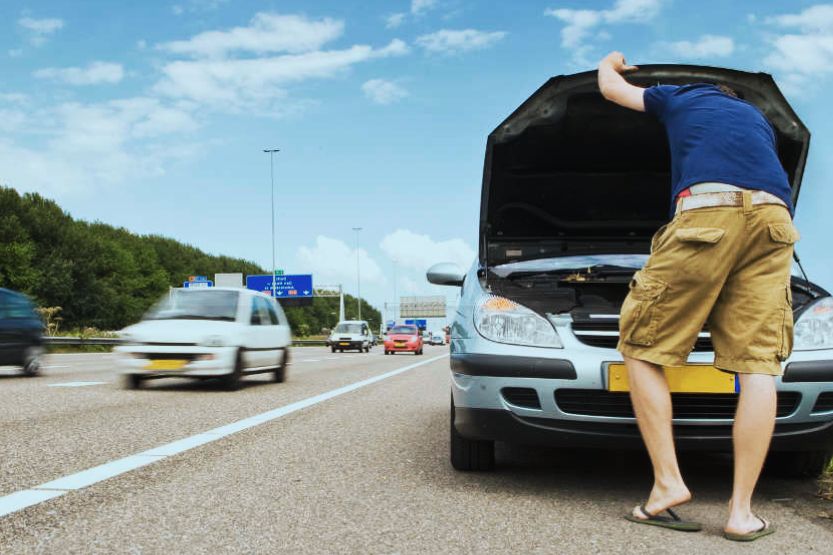
1. Drive to the Side of the Road and Stop Your Car
First of all, try not to panic! You would want to drive your car as soon as you notice it is slowing down. Pull over to avoid any vehicles behind you colliding with your back because vehicles on the highway often go at a fast pace.
2. Attempt to Restart Your Car
The next step is to see if you can restart your car so that you can at least get to the closest auto repair shop now that your vehicle is safely off the side of the road. In some cases, you might be able to force your car to restart if you’re fortunate and can identify or narrow down the cause.
3. Try to Drive Up a Steep Hill
If your car shuts off when brakes are pressed, go for a drive up a steep hill. Do this to determine whether the car’s engine performance has changed.
Is it still stalling? If the answer is yes, the problem is a clogged or blocked fuel filter.
The good news is that replacing a fuel filter is affordable and straightforward. Finding where it is is all you need to do. The filter is located in the gas tank usually. And because of this, getting to the filter could be challenging for you.
4. Use Emergency Flashers to Warn Other Drivers
If you cannot restart your car, you must activate your emergency flashers to warn other cars that you will not be merging back into traffic. This will keep you secure while you decide what to do next.
5. Adjust the Injector, Ignition Control System, or the Distributor Timing
Change the timing of the distributor by using the right tools. Also, use a mechanic’s scope or screwdriver to inspect the fuel injection system. Injectors in operation typically generate a snapping or clicking noise. However, the absence of any sound denotes a faulty or damaged injector.
6. Check the Electrical or Fuel Systems
The engine stops working when it cannot ignite the fuel in the car’s cylinders. This happens due to the absence of the necessary gas or electrical charge for igniting. You must examine these two components to determine the chance of your car switching off while slowing down.
7. Contact a Qualified Mechanic
Contact a qualified mechanic. To help identify the origin and cause of your car shutting off when slowing down or stopping, you can call a mobile mechanic who will come to your residence.
You will receive a thorough inspection report that includes information on the extent and price of the repairs.
The mechanic will usually test drive your car to see if they can spot the problem. Additionally, they listen to the engine while idling for misses, backfires, or other odd noises.
To gather data on stored codes, they will use a scan tool to access the transmission control computer or engine control unit and then identify the root cause of the car’s self-shutdown.
What to Do When a Car Died While Driving and Won’t Start
FAQs
Why Does My Car Turn Off When I Stop?
Your car’s engine is particularly sensitive at idle, which can cause it to shut off when you stop. Many factors can contribute to this, but the most common one is a lean fuel mixture that causes the idle to dip too low.
Can a Car Suddenly Shut Off While Driving Due to a Damaged Battery?
A faulty battery rarely results in the engine shutting off because the alternator supplies the necessary power. In some uncommon circumstances, your car battery may experience such a short circuit that it will turn off.
Why Does My New Car Turn Off When Stopped at a Light?
When a car comes to a complete stop and idles for more than a few seconds, the engine automatically shuts off thanks to auto start/stop technology. The engine restarts when the driver applies pressure to the accelerator. It’s easy, and some claim it can reduce gas use in stop-and-go traffic by 3 to 5%.
Can a Car Turn Off Due to Low Oil?
Your car won’t shut off due to low engine oil in most cases. The car may turn off the engine for safety if the level is so low that the oil pressure is about to drop.
Conclusion – Why Your Car Turns Off When Stopped or Slowed Down
So, while we all know that a car should function like a well-oiled machine, it may experience issues in unexpected places.
Call a professional immediately for a thorough inspection when your car shuts off while running slowly. Alternatively, you can diagnose the issue and see if you can fix the problem.
There are many potential causes, such as:
- A faulty engine control unit,
- A malfunctioning crankshaft position sensor,
- A faulty alternator,
- An empty fuel tank with a defective fuel gauge,
- Clogged fuel pump or system,
- A damaged ignition switch, and
- Problematic spark plugs.
Read next:




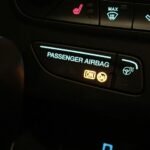
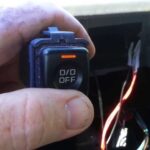
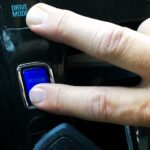
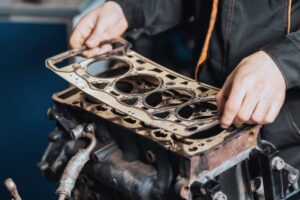
![Read more about the article Triangle With Exclamation Point [What Is It and How to Fix?]](https://roadsumo.com/wp-content/uploads/2022/03/triangle-with-exclamation-point-300x200.jpg)
